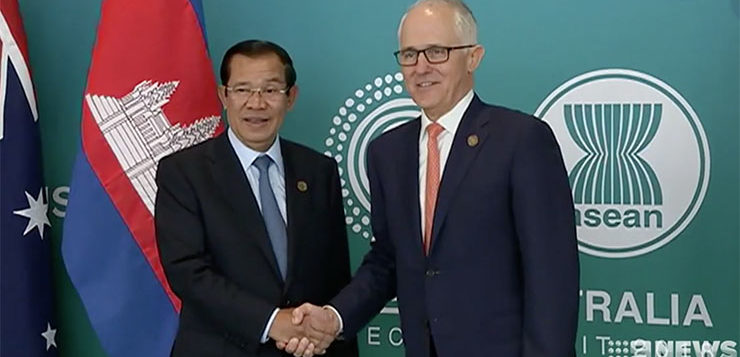In the image above, Prime Minister Malcolm Turnbull is seen shaking hands with Hun Sen during the ASEAN Summit in Sydney last week. Smiling. Hun Sen is the dictator of Cambodia, which he has ruled since 1985. Under the reign of Pol Pot, Hun Sen served as a battalion commander in the Khmer Rouge army.
It is worth underscoring what this means. Ben Kiernan wrote a book, The Pol Pot Regime. Kiernan is the founding director of the Genocide Studies Program at Yale University. He found that the Khmer Rouge was responsible for the deaths of some 1.7 million people. That is about one fifth of the entire population, wiped out by its own government.
That makes Hun Sen a triumphant and reigning dictator from one of the most murderous governments of the 20th century.
Cambodians in Australia have protested the welcome extended to Hun Sen by our government. I was alerted to this issue by someone who came to Australia as a refugee from Cambodia. Dozens of family members, on both her mother and her father’s side of the family, were murdered by the Khmer Rouge.
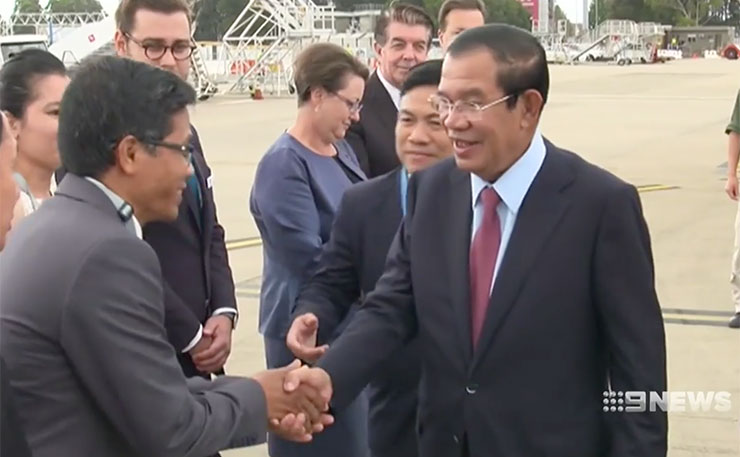
As if to underscore his commitment to despotism, Hun Sen has responded to protesters in Australia by saying “I want to remind those who plan to demonstrate against me that my visit is an honour for their government… If they burn my effigy … I will pursue them to their houses and beat them up… If you treat me inappropriately, I will hit back and leave shame on your face at the scene”.
Turnbull said he’ll discuss a range of issues with Hun Sen, including human rights. I suppose he wants us to take him at his word that this private conversation will be serious, given that his public comments were so devoid of substance.
So let us consider some of Turnbull’s other friends. First, let’s take the case of Myanmar. Turnbull has dismissed accusations of human rights abuses in Cambodia and Myanmar as “sweeping generalisations”. Unlike Indonesian President Joko Widodo (Jokowi), who said he would confront Myanmar about its treatment of the Rohingyans. Turnbull notably refused to use the term Rohingya, the minority the Myanmar government persecutes (whilst also denying that they exist as a group).
Compare this to the recent speech by the United Nation’s Special Rapporteur on human rights in Myanmar. Discussing the ethnic cleansing of Rohingyans from Myanmar since 25 August 2017, she observed that “there are now more Rohingya people outside Myanmar than within – the vast majority of whom are taking refuge in Cox’s Bazar.”
Attacks since that date “by security forces led to record numbers of people fleeing Rakhine State in the weeks that followed. I dreaded the worst was coming to pass and that the Myanmar military was finally looking to complete what it described as its ‘unfinished business from World War II’ – the clearing of the Rohingya out of the country.” Since then, “whole villages that were once home to Rohingya have been bulldozed to the ground”.
She described the nature of the violence that caused this large-scale exodus:
“I heard first-hand of attacks in which homes were set ablaze by security forces, in many cases with people trapped inside, and entire villages razed to the ground. Parents told me harrowing accounts of witnessing their young children being thrown into fires. Survivors described the security forces calling families out of their homes, separating men and boys to be executed in front of their families or taken away. I heard testimony of women and girls being raped and then killed, some burned alive in their homes while unconscious or tied up.”
When these attacks weren’t able to remove Rohingya out of Myanmar, the army adopted “a policy of forced starvation in place, designed to make life in northern Rakhine unsustainable for Rohingya who remain.”
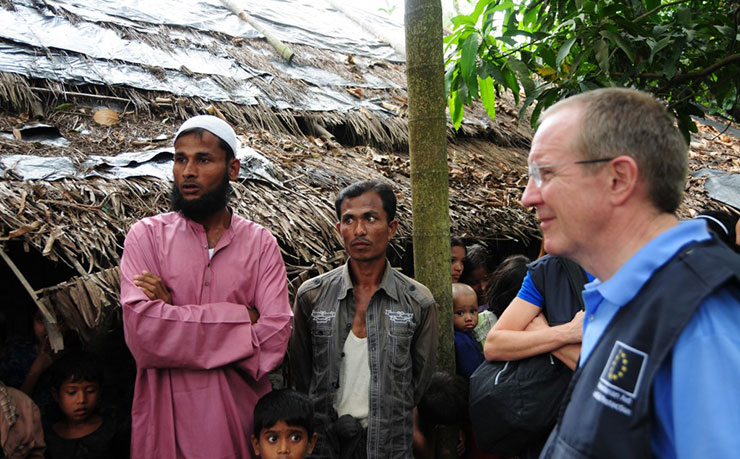
(IMAGE: Christophe Reltien, EU/ECHO, Rakhine State, Flickr)
Strikingly, four years ago, the Human Rights Council was given notice about possible crimes against humanity in Myanmar. Increased international scrutiny has not halted the atrocities – indeed, they have escalated in the last few years. The rapporteur concluded that, “I am becoming more convinced that the crimes committed following 9 October 2016 and 25 August 2017 bear the hallmarks of genocide and call in the strongest terms for accountability.”
In September last year, Turnbull’s government defended its military support for the Myanmar military carrying out those atrocities. According to DFAT, “The DFAT spokesman said Australia opposed language that could be seen as pre-judging the outcomes of a UN fact-finding mission that Myanmar’s government has refused to allow to enter Rakhine.” This ridiculous pretext is hard to take seriously, given the UN has hardly been agnostic about how Myanmar treats Rohingya people.
In December, Fairfax wrote in an editorial: “Indiscriminate killing, mass rape and arson. Unimaginable atrocities, committed by Myanmar’s armed forces, local militia and even Buddhist monks. Soldiers shouting anti-Muslim obscenities while shooting people. The extreme cruelty in North Rakhine state revealed by Fairfax Media’s south-east Asian correspondent Lindsay Murdoch is almost beyond comprehension.” The “deliberate killing of a specific ethnic group, is genocide. It has caused the fastest refugee exodus since the Rwandan genocide. Soon the depopulation of Rohingya from northern Rakhine will be complete. We must make it stop before it reaches that point.”
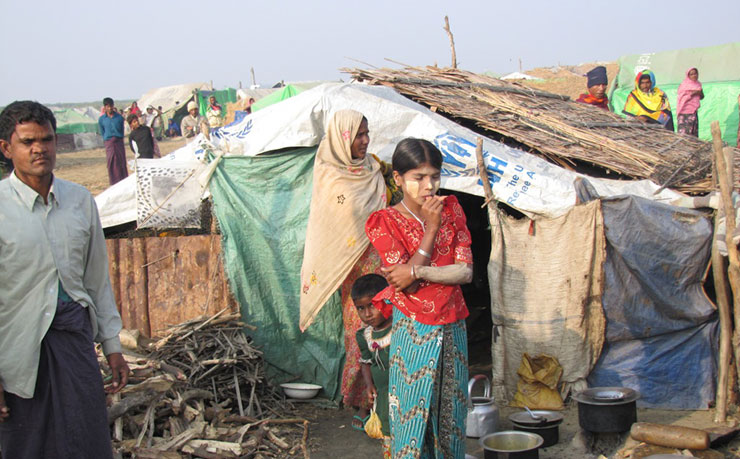
It identified Myanmar’s murder of some 13,769 Rohingya people as a crime against humanity. Then, with disgust, the editorial noted “the Turnbull government continues to resist the growing calls for it to end Australian Defence Force training and support to Myanmar’s military in response to the atrocities.”
Foreign Minister Julie Bishop has only said she is “deeply concerned”. That is “not good enough… Australia must immediately condemn Myanmar’s actions in the strongest manner, and call them out for what they undoubtedly are. We must end any co-operation with the Myanmar military.”
Nothing happened. The commitment to supporting Myanmar’s military was again affirmed in early March, just a few weeks ago. It should be noted, the above paragraphs only scratch the surface of the horrors of Myanmar’s treatment of the Rohingya people. So why shouldn’t Turnbull pose with the remnant dictator of the Khmer Rouge?
Turnbull is also supporting the Saudi-led war on Yemen, which has left some seven million people on the brink of famine. After approving four military exports to Saudi Arabia in 2016, we approved another five military exports in June last year. Minister for Defence Industry Christopher Pyne has repeatedly visited Saudi Arabia to expand our military exports to them, even as the crisis has worsened.
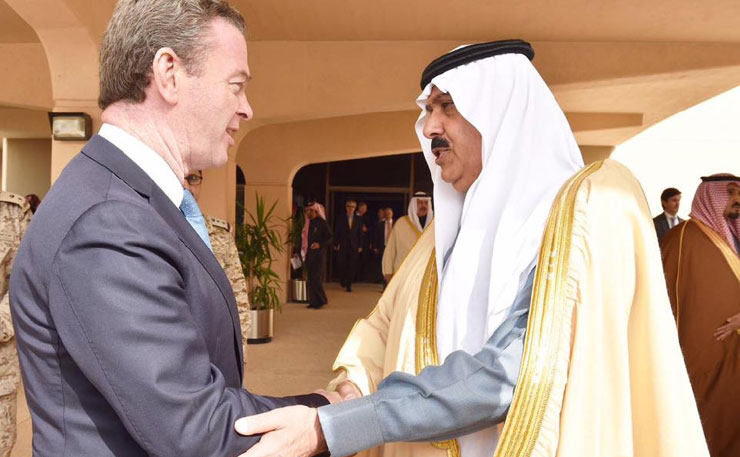
The Labor Party has shown a similar concern for millions on the brink of famine, by refusing to take a position on the war, the blockade, our military exports to Saudi Arabia, or the contribution to the war by Australian mercenaries. Labor responded to Pyne’s announcement of expanding our entire military export industry by complaining he was doing so too late, having allegedly “damage[d]the defence industry” in Australia.
One can likewise expect that Turnbull won’t confront Joko Widodo about West Papua. From Gough Whitlam to John Howard, and everyone in between, 24 years of Australian Prime Ministers supported the brutal occupation of East Timor, which wiped out maybe 180,000 people. This was explained frankly in internal communications by the ambassador to Indonesia in 1975, Richard Woolcott: “Our relations with Indonesia in the long-term are more important to us than the future of Portuguese Timor”.
Furthermore, “closing the present gap in the agreed sea border… could be much more readily negotiated with Indonesia by closing the present gap than with Portugal or independent Portuguese Timor.” He frankly admitted, “I know I am suggesting that our principles should be tempered by the proximity of Indonesia and its importance to us and by the relative unimportance of Portuguese Timor but, in my view, this is where our national interest lies.”
That is, a vulnerable population of some 650,000 was trivial, ready to be sacrificed on the altar of our national interest.
Not much has changed. In 2013, the military dictator of Egypt cemented his coup against the freely elected government with a series of massacres of non-violent protesters, abolishing the incipient democracy. Prime Minister Tony Abbott explicitly praised the “legitimacy” of the new government, and “[understood]the need” of the government to “crackdown on extremism” – indeed, he “congratulated” the dictator Abdel Fattah el-Sisi on it. And when the Saudi tyrant died, Abbott was upset too. He offered his “deepest condolences”, citing the King’s “many achievements” and support for “interfaith dialogue”. People are sentenced to death for atheism in Saudi Arabia. The late tyrant who so tragically passed achieved this in 2014 by redefining atheists as terrorists.
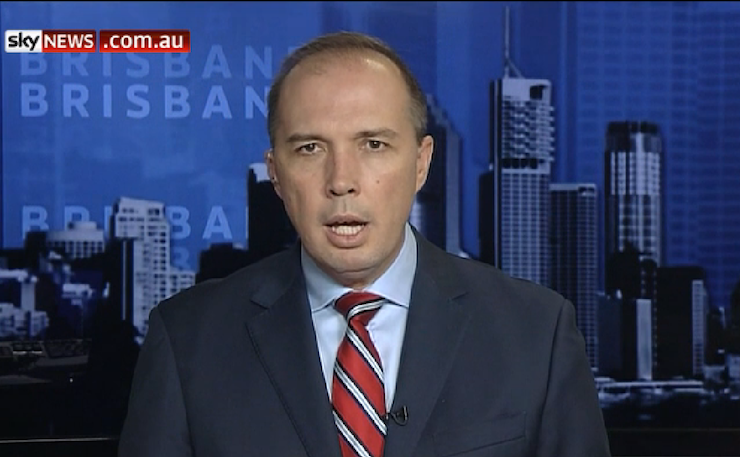
A few days ago, Home Affairs Minister Peter Dutton caused international outrage with his offer to provide the refuge of a “civilised country” to white South Africans facing imaginary persecution. There are plenty of oppressive governments and vulnerable populations in Africa, and indeed in conflicts that Australia is involved in. It is impossible to understand Dutton singling out white (non-) victims for safety other than racism. Indeed, Dutton’s promotion is precisely because of the Turnbull government’s commitment to institutionalising racism.
Whilst outrage due to Dutton’s overt rhetoric is justified, we should remember that Australia has long practiced selectivity in its regard for the lives of people in other countries. It’s why Australian leaders got cosy with Suharto, the tyrant of Indonesia, or why Australia sends military exports to countries like Saudi Arabia and Myanmar.
Fundamentally, the Australian government does not, and never has, batted an eyelid about atrocities, up to and including genocide.
Not all that surprising when you consider our nation was founded on the devastation and destruction of Aboriginal communities across the continent.
Donate To New Matilda
New Matilda is a small, independent media outlet. We survive through reader contributions, and never losing a lawsuit. If you got something from this article, giving something back helps us to continue speaking truth to power. Every little bit counts.

